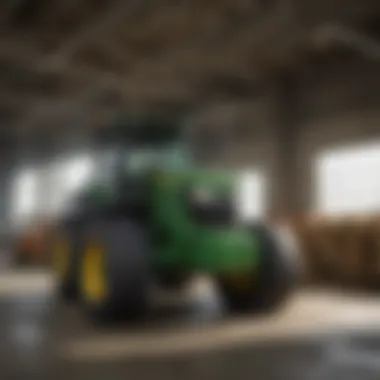Understanding John Deere's Impact in Frankfort, IN


Intro
John Deere has long symbolized quality and innovation in agricultural equipment. This article explores its operations and influence in Frankfort, Indiana. We will delve into the historical context, the technological advancements, and the broader economic contributions that John Deere has provided to the local community and agriculture as a whole.
Topic Overview
Definition of Key Terms
Understanding the role of John Deere in Frankfort requires familiarity with some terms.
- Agriculture refers to the practice of cultivating soil, growing crops, and raising livestock for food and other products.
- Horticulture encompasses the cultivation of plants, especially in gardens, orchards, and nurseries.
- Agronomy is the science of soil management and crop production.
John Deere's equipment often merges the lines between these fields, serving various purposes across agricultural practices.
Relevance in Agriculture, Horticulture, and Agronomy
John Deere's products play an essential role in modern farming techniques. In Frankfort, the company supports both large-scale agriculture and local farming initiatives. This is significant because it affects productivity, sustainability, and economic growth. Local farmers increasingly rely on John Deere for modern tools that enhance efficiency in their farming practices.
Current Trends and Innovations
Recent Advancements in the Field
In recent years, John Deere has made considerable advancements in machinery and technology.
- Precision Agriculture: This includes using GPS and data analytics to optimize crop yields and monitor equipment performance.
- Sustainable Practices: John Deere is focusing on machinery designed to reduce environmental impact, such as low-emission engines and biodegradable lubricants.
Emerging Technologies and Practices
Emerging technologies in agriculture continue to evolve. Some notable examples are:
- Automation: Robotic systems are becoming vital for tasks like seeding and harvesting.
- Drones: Used for monitoring crop health, these devices provide real-time data for farmers.
Practical Applications
Step-by-Step Guides or How-Tos
Farmers in Frankfort can maximize the benefit from John Deere's resources. Here’s a basic approach:
- Assess Land Needs: Understand crop requirements for your specific land.
- Choose Equipment: Select the right John Deere equipment based on your farming goals.
- Implement Technology: Use precision tools to monitor growth and yield.
Tips and Best Practices for Implementation
- Regularly maintain machinery to ensure optimal performance.
- Stay educated about new technologies through workshops and seminars.
- Network with other farmers to share insights and practices.
"The key to successful farming is not just in planting seeds but in using the best tools to cultivate them."
As John Deere continues to innovate, farmers in Frankfort will likely see even more improvements in agricultural practices and productivity.
Historical Overview of John Deere
Origins and Growth
John Deere is synonymous with agricultural innovation and excellence. Established in 1837 by blacksmith John Deere in Grand Detour, Illinois, the company introduced a revolutionary steel plow. This tool enabled farmers to cultivate the tough soil of the American Midwest more efficiently than ever before. At that time, wooden plows would often wear out quickly and break, making Deere’s design a significant leap forward in farming technology. As the demand for better agricultural tools grew, so too did the vision of John Deere. The simple yet effective plow marked the beginning of a brand that would continuously adapt and evolve to the changing needs of agriculture.
As railroads expanded throughout the United States in the late 1800s, Deere's operations were able to reach further markets. His focus on quality and service quickly earned the company a reputable standing in the industry. By 1918, Deere and Company had a strong lineup of products and was ready to meet the growing needs of a farming society that was evolving rapidly due to mechanization. Their expansion set a precedent for what would eventually become an agricultural powerhouse.
Expansion into Indiana
Indiana began to play a critical role in John Deere's expansion story in the 20th century. The state offered ideal agricultural conditions and a workforce eager for innovative farming solutions. Opening its first facility in Fort Wayne in the 1910s, the company's presence in Indiana allowed it to tap into local markets and cater to regional needs effectively. The location not only made logistics easier due to access to major transportation routes but also fostered connections with local farmers who were eager for both high-quality equipment and reliable service.
As demand for tractors and other mechanized farming equipment grew through mid-20th century, John Deere cemented its reputation by establishing additional facilities in Indiana, one of which is located in Frankfort. The establishment of this factory marked a significant milestone, demonstrating the company's commitment to local agricultural communities. Here, John Deere could create products tailored to the specific needs of Midwestern farmers, thus enhancing their productivity and livelihoods.


"John Deere’s expansion into regions like Indiana exemplifies its strategic approach to meet localized farming demands while contributing to regional economies."
Overall, the historical overview of John Deere plays a crucial role in understanding its current operations, including those in Frankfort, Indiana. It reveals how a commitment to innovation and adaptation has enabled the company to thrive across various changes in the agricultural landscape.
John Deere's Frankfort Facilities
The Frankfort facilities serve as a crucial hub for John Deere's operations, impacting its overall efficiency and product offerings. Located strategically in Indiana, these facilities are emblematic of the company’s commitment to excellence in manufacturing and innovation. The site provides unique benefits, including access to a skilled workforce and proximity to agricultural markets, which enhance the company’s ability to respond quickly to customer needs.
Manufacturing Capabilities
John Deere's manufacturing capabilities in Frankfort are significant. The facility focuses primarily on producing high-quality agricultural equipment that meets the rigorous demands of modern farming. The production line is optimized for efficiency, utilizing state-of-the-art machinery and automated systems. This allows the facility to maintain high output levels without sacrificing quality.
Moreover, the skilled workforce plays a pivotal role. Employees undergo continuous training to keep pace with technological advancements. They boost productivity and ensure that John Deere maintains its reputation for durable and reliable products. This blend of innovation and human expertise positions the Frankfort facility as a leader in agricultural manufacturing.
Product Lines Specific to Frankfort
In Frankfort, John Deere specializes in several key product lines tailored to the needs of farmers in the region. Notable among these are:
- Tractors: The facility produces various models, designed to cater to different farming scales.
- Harvesters: These machines are engineered for efficiency and performance during harvest season.
- Attachments: A range of attachments are also manufactured, providing versatility to the base machines.
This focus on specific product lines allows John Deere to serve its customers better by offering customized solutions that enhance productivity and ease of use in daily farming operations. By concentrating on these lines, the Frankfort facility strengthens its market position while addressing local farmers' specific requirements.
Innovation and R& Initiatives
Innovation is at the heart of John Deere's strategy, and the Frankfort facility is no exception. The site engages in continuous research and development initiatives, focusing on improving equipment efficiency and sustainability in agriculture. This includes enhancements in fuel efficiency and reductions in emissions, directly addressing environmental concerns crucial to modern farming.
The facility collaborates with local universities and research institutions, creating a synergy that fosters cutting-edge technology in agricultural practices. The emphasis on R&D not only enhances product development but also solidifies John Deere's reputation as a leader in agricultural technology, ensuring long-term growth and adaptability in a rapidly changing market.
"Investing in innovation at our Frankfort facility enables us to better support farmers with advanced solutions that drive productivity and sustainability."
In summary, John Deere's Frankfort facilities exemplify the company’s dedication to manufacturing excellence, product specialization, and cutting-edge innovation. These elements combine to fulfill the needs of today’s agriculture and set the stage for future growth.
Economic Impact of John Deere in the Region
The economic influence of John Deere in Frankfort, Indiana, is significant and multifaceted. The employment opportunities generated by the company's operations are just one facet of its impact. The facility serves as a vital contributor to local economic stability and growth. It also plays a role in enhancing the region’s agricultural landscape and provides essential services that extend beyond its immediate operations.
Job Creation and Workforce Development
John Deere is a major employer in Frankfort. The operational scale necessitates a substantial workforce that encompasses various skills and expertise. This includes positions in manufacturing, engineering, and logistics. As a result, the company has been instrumental in job creation, making a considerable difference in the local economy.
Moreover, John Deere places a strong emphasis on workforce development. The organization collaborates with local educational institutions to develop programs that equip individuals with the necessary skills for careers in agriculture and manufacturing sectors. These partnerships help prepare students for roles in advanced technology and support continuous learning and professional growth.
In addition to creating direct employment, John Deere also stimulates indirect job growth. Local suppliers, service providers, and businesses benefit from the demand generated by the facility. The ripple effect of job creation is evident in the way it enhances community livelihoods and sustains local economies.
Local Business Support
Beyond direct employment, John Deere contributes to the economic health of the region through robust support for local businesses. The company prioritizes partnerships with local suppliers for its manufacturing needs, which helps small businesses thrive. By sourcing materials and services locally, John Deere aids in sustaining local commerce.
This symbiotic relationship strengthens the overall economic fabric of Frankfort. For instance, local companies that provide parts, equipment, or services to John Deere see increased demands for their offerings. Consequently, local businesses expand their operations and hire more staff to meet this demand.
Additionally, John Deere's community-focused initiatives often involve collaborations with local enterprises. Whether through sponsorship events or local supply chains, the company integrates itself into the broader economic ecosystem of Frankfort. This fosters a spirit of collaboration that is crucial for regional development and economic resilience.
"The presence of John Deere in Frankfort has not only created jobs but has also empowered a network of local businesses to flourish, ultimately contributing to a more robust community."
In summary, the economic impact of John Deere in Frankfort encompasses direct job creation and broader support for the local economy. Both the workforce development initiatives and the partnerships with local businesses demonstrate the company’s commitment to steering the region toward growth and sustainability.
Community Engagement and Social Responsibility
Community engagement and social responsibility are pivotal elements within the operations of John Deere in Frankfort, Indiana. These factors not only enhance the company's reputation but also foster a supportive relationship with the local community. By actively participating in social initiatives and programs, John Deere demonstrates a commitment to making a positive impact, which is increasingly important in today’s business landscape.
Social responsibility encompasses various aspects, including environmental stewardship, ethical labor practices, and contributions to community welfare. Recognizing the significance of these factors allows John Deere to align its corporate goals with the expectations of both customers and stakeholders. Through consistent community engagement, businesses like John Deere can build trust and rapport, which can ultimately translate into customer loyalty and enhanced profitability.
Community Programs and Initiatives


John Deere has engaged in several community programs and initiatives that reflect its dedication to bettering the Frankfort area. One notable program is the support of local agriculture through sponsorships of farming events and workshops. These events provide valuable networking opportunities and knowledge sharing among local farmers. In addition, John Deere helps to promote sustainable farming practices, which can strengthen the region’s agricultural economy.
Typically, John Deere employees volunteer in various community projects such as Habitat for Humanity and local food banks, allowing the team to contribute their time and skills. These efforts not only aid those in need but also foster team building among employees, enhancing their morale and commitment to the company’s mission.
"Engagement in community initiatives illustrates a company’s understanding of its role beyond profit, promoting long-term relationships with stakeholders."
Some key programs might include:
- Financial contributions to local schools and organizations
- Organizing clean-up drives for public spaces
- Providing scholarship opportunities for local students
Educational Partnerships
Alongside community programs, John Deere places a strong emphasis on developing educational partnerships. By collaborating with local educational institutions, the company aims to inspire future generations of engineers, agronomists, and technicians. These partnerships often include internship programs that provide students with hands-on experience, exposing them to real-world applications of their studies.
Moreover, these collaborations can lead to curriculum enhancements that reflect the needs of the industry. For instance, technology-focused courses ensure that students acquire the necessary skills to engage with advanced machinery and equipment, fostering a well-trained future workforce. Such partnerships also provide career days and workshops, connecting students with potential employers, ultimately making a significant difference in the local economy.
Technological Advancements at John Deere
Technological advancements are crucial for John Deere's operations and overall strategy. These innovations not only drive efficiency but also enhance the productivity of farmers and the agricultural sector as a whole. As farming practices become more complex, the integration of cutting-edge technologies becomes a necessity. John Deere has embraced this challenge, establishing itself as a leader in agricultural technology.
Precision Agriculture Technologies
Precision agriculture employs advanced techniques to optimize field-level management regarding crop farming. John Deere's implementation of Precision Agriculture Technologies focuses on data analytics, real-time monitoring, and resource management. This approach allows farmers to make informed decisions based on empirical data rather than guesswork.
Some key elements of this technology include:
- GPS-guided equipment: Enhances accuracy in planting, fertilizing, and harvesting.
- Field sensors: Provide insights into soil conditions and moisture levels, enabling precise interventions.
- Data analytics platforms: Analyze data collected from various sources to create actionable recommendations.
The benefits of precision agriculture are substantial. Farmers can reduce input costs, increase crop yields, and minimize environmental impacts. This technology reshapes traditional agriculture, aligning it with modern demands.
"The use of precision agriculture technologies is transforming how we farm, making it more efficient and sustainable."
Integration of AI and Robotics
The integration of Artificial Intelligence (AI) and robotics at John Deere represents a paradigm shift in agricultural practices. These technologies support automation and streamline various tasks on farms, freeing up time and resources for farmers.
Examples of AI and robotics in use include:
- Autonomous tractors: Operating without human intervention, these machines can work continuously and complete tasks more efficiently.
- AI-driven analytics: Helps in predicting crop performance and identifying potential problems before they escalate.
- Robotic harvesters: Enable faster and more effective harvesting, crucial during peak seasons.
This not only improves productivity but also enhances safety on farms by taking over hazardous tasks.
Integrating AI and robotics into John Deere's operations is not merely an evolution; it's a revolutionary step towards a more sustainable future in agriculture.
Sustainable Practices in Agriculture
Sustainable practices in agriculture are essential for fostering an environment that supports both productivity and ecological integrity. The approach does not only aim at increasing crop yields but also considers the long-term health of the land, water, and ecosystems. John Deere in Frankfort, Indiana, embraces sustainable practices that align with global efforts to combat environmental degradation while addressing the needs of farmers. This section highlights the importance of sustainability in farming and how John Deere contributes to it through committed actions and innovative technology.
Commitment to Sustainable Development
John Deere's commitment to sustainable development reflects a strategic vision that goes beyond just profit. The company aims to balance economic growth with environmental responsibility. This is evident in its investment in research and development for sustainable technologies.
- Resource Efficiency: John Deere focuses on enhancing resource efficiency in its manufacturing processes. This translates to lower emissions, reduced waste, and optimal use of water and energy.
- Soil Health: The company promotes practices that improve soil health, such as crop rotation and reduced tillage. These methods not only enhance biodiversity but also lead to higher productivity over time.
- Community Involvement: Engaging with local communities ensures that farming practices are informed by the unique ecological context of the region. Workshops and educational initiatives empower farmers to adopt sustainable techniques effectively.
Environmental Initiatives at the Frankfort Facility
The Frankfort facility plays a crucial role in John Deere's overall environmental strategy. The initiatives taken here aim to minimize the ecological footprint of operations while maximizing efficiency and innovation.
- Energy Conservation Programs: The facility implements energy-saving technologies. This includes using energy-efficient machinery and optimizing the manufacturing process to reduce energy consumption.
- Water Management: With a focus on preserving local water sources, John Deere has instituted measures to recycle water used in production. This not only conserves water but also reduces the impact on wastewater systems.
- Waste Reduction Strategies: The facility actively seeks to minimize waste through recycling programs and the reduction of non-essential materials in production processes. This is important for meeting sustainability goals and enhancing community relations.
These aspects highlight how John Deere’s operations in Frankfort, Indiana, align with sustainable agricultural practices. The company not only produces equipment but also champions practices that sustain the environment and support farmers. John Deere's proactive stance on sustainability serves as a model within the agricultural sector, reinforcing its pivotal role in achieving a resilient and sustainable future.
Customer Support and Services


Customer support and services are critical components of John Deere's operations in Frankfort, Indiana. The company understands that providing excellent support not only enhances customer satisfaction but also fosters loyalty among farmers and agricultural enthusiasts. This commitment to service ensures that customers maximize the value of their investment in equipment.
Aftermarket Support and Maintenance
Aftermarket support encompasses a wide range of services that John Deere offers post-purchase. This includes parts availability, repair services, and warranty assistance. The Frankfort facility maintains a robust supply chain for parts, ensuring farmers have quick access to necessary components. This is important for minimizing downtime during peak farming seasons. Furthermore, trained technicians are available for on-site repairs or through service centers, allowing for efficient problem resolution.
The benefits of effective aftermarket support are many. It helps farmers maintain their equipment in optimal condition, reducing long-term costs associated with major repairs. Regular maintenance and support ensure that machines operate at peak performance, which directly influences productivity in the field.
Training and Resources for Farmers
John Deere also emphasizes the importance of education through training and resources tailored specifically for farmers. The company offers workshops, seminars, and online courses that cover topics ranging from equipment operation to advanced agricultural technology. These training sessions help farmers better understand how to use their devices effectively, ensuring they gain the most from John Deere's innovative technologies.
Additionally, the resources provided through various platforms, including manuals and instructional videos, allow farmers to seek information at their convenience. This is particularly helpful for new technologies that require a learning curve.
"Providing education is as vital as providing equipment; knowledge empowers farmers to implement efficient practices."
The integration of training programs fosters a community of informed users who can share best practices, ultimately benefiting the entire industry.
In summary, John Deere's commitment to customer support and services in Frankfort enhances the overall customer experience. From aftermarket support to educational resources, these efforts contribute significantly to the success of farmers in the region, ensuring they have the necessary tools and knowledge at their disposal.
Future Prospects for John Deere in Frankfort
The future of John Deere in Frankfort, Indiana, is a subject of great importance. This segment analyzes potential growth and development opportunities in the company’s operations within the region. With agriculture constantly evolving, John Deere must stay ahead of the curve not only through production but also by fostering innovation and meeting market needs.
The strategic positioning of Frankfort as a manufacturing hub gives John Deere unique benefits. The location allows for efficient logistics and a ready supply of skilled labor. Furthermore, ongoing developments in technology and agricultural practices signify an increase in the demand for advanced agricultural equipment. This creates an environment ripe for John Deere to expand its market presence.
Expanding Market Opportunities
John Deere's market prospects hinge on several critical aspects. Firstly, global shifts towards sustainable agriculture provide a fertile ground for growth. Farmers are increasingly adopting eco-friendly practices. They need machinery that supports these methods. John Deere can capitalize by innovating its product lines to include more environmentally friendly equipment.
Additionally, as emerging economies develop, there is a rising demand for agricultural machinery. Countries in South America and Asia are focusing on modernizing their agricultural processes. John Deere's established reputation can help the company penetrate these new markets effectively.
- Advanced manufacturing techniques can improve production efficiency.
- Adaptable machinery designs can cater to diverse agricultural needs.
- Collaboration with local businesses extends market reach and supports community growth.
Strategic Investments in Technology
Technology will play a crucial role in shaping John Deere's future in Frankfort. Investing in technologies like artificial intelligence, automation, and data analytics will not only enhance product offering but also streamline operations. These strategies are essential for keeping pace with industry demands.
Investments in research and development will enable the company to create innovative solutions tailored for today's farmers.
Some areas to focus on include:
- Enhanced User Interfaces: Making equipment easier for farmers to operate, particularly for newer generations.
- Data-Driven Farming Tools: Providing tools that allow farmers to analyze crop health, soil conditions, and yield predictions.
- Integration of Robotics: Employing unmanned equipment for improved efficiency and safety in the field.
By strategically investing in these technologies, John Deere can maintain its competitive edge and adapt to the changing landscape of agriculture.
Finale
In summary, the conclusion of this article emphasizes the multifaceted role John Deere plays in Frankfort, Indiana. This section distills the major key findings of the article, offering both a recap of information and insight into the wider implications of John Deere's operations in the sector. The focus is not merely on John Deere's substantial contributions but also on its ongoing commitment to evolving agricultural practices.
Summary of Key Findings
The exploration of John Deere's impact reveals several critical aspects:
- Historical Significance: John Deere has a deep-rooted history in the region. The company's origins and subsequent expansion illustrate its long-standing commitment to American agriculture.
- Technological Innovations: The Frankfort facility is a hub for cutting-edge technology. Innovations in precision agriculture and the integration of AI stand out as significant advancements that redefine agricultural practices.
- Community Engagement: The social responsibility initiatives highlight John Deere's investment in local communities through programs that focus on education and workforce development.
- Economic Contributions: John Deere’s presence in Frankfort bolsters local economies through job creation and partnerships with nearby businesses, ensuring a holistic benefit to the community.
This summary encapsulates essential findings that underline how John Deere not only operates as a company but acts as a crucial driver of positive change in both the local community and the agricultural sector at large.
Implications for the Agricultural Sector
The influence of John Deere in Frankfort extends far beyond its manufacturing capabilities. The implications for the agricultural sector are profound:
- Adoption of Technology: As John Deere fosters technological advancements, farmers can expect increased efficiency and productivity. Technologies developed at the Frankfort facility empower farmers to make better data-driven decisions, which is critical in today's agricultural landscape.
- Sustainability Practices: John Deere’s commitment to sustainable practices sets a benchmark for industry standards. As the company invests in environmentally responsible initiatives, it encourages the agricultural sector to adopt similar practices, reinforcing the necessity for sustainability in farming.
- Economic Viability: The job opportunities generated not only support families but also strengthen the agricultural supply chain. The collaboration with local businesses enhances market dynamics, promoting growth in the sector and sustaining rural economies.
Overall, these implications highlight how John Deere's strategic initiatives can serve as a model for other players in the agricultural field, urging them to adapt and innovate in a rapidly changing environment.
"John Deere's presence in Frankfort symbolizes more than just agricultural machinery; it embodies a commitment to community growth and innovation in farming practices."
The article concludes with a call to action for industries and communities alike to actively engage in evolving agricultural opportunities, reaffirming the vital connection between technology, sustainability, and economic growth.



